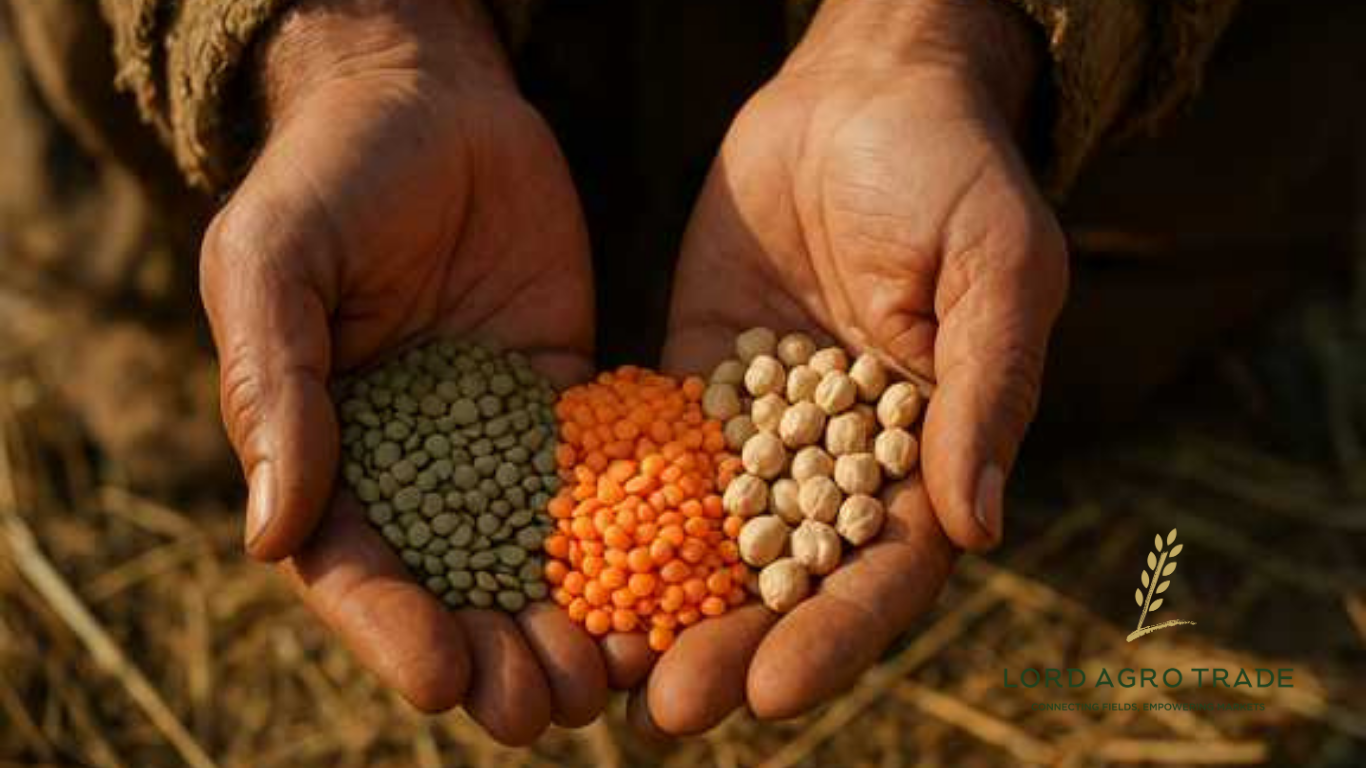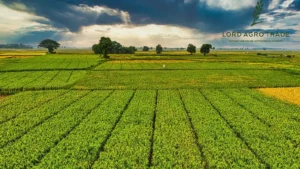Gulfood
17 To 21 FEB 2025 | DUBAI WORLD TRADE CENTRE
We’re excited to see you at Gulfood 2025!
Gulfood
17 To 21 FEB 2025 | DUBAI WORLD TRADE CENTRE
We’re excited to see you at Gulfood 2025!


The Canadian lentil and chickpea industry is one of the world’s leading suppliers of high-quality pulses. As global demand for plant-based proteins continues to rise, Canada’s lentil and chickpea are becoming more important than ever in international markets. Lord Agro Trade, a leading Canadian pulse exporter, plays a key role in meeting this growing demand. However, traditional agricultural and export systems face challenges related to efficiency, quality control, and logistics. This is where Artificial Intelligence (AI) and digitalization are transforming the way Lord Agro Trade produces, manages, and exports Canadian pulses.
Canada accounts for a significant portion of the world’s lentil and chickpea exports. The country’s clean soil, advanced farming techniques, and government support make it a top exporter. Yet, the growing global demand for high-quality pulses means Canadian farmers and exporters must adopt smarter and more efficient practices.
By integrating digital tools and AI, the industry can optimize production, improve quality, and streamline the supply chain to meet global standards.

Traditional supply chains face several challenges:
High Volumes and Dispersed Markets:
Exporters often handle large quantities of products that need to reach multiple markets across different regions or countries. Managing these high volumes requires precise logistics planning to ensure timely delivery and avoid bottlenecks. Without careful coordination, shipments can be delayed, costs can rise, and customer satisfaction can suffer. Moreover, seasonal variations and fluctuating demand make forecasting and scheduling even more complex.
Quality Control Issues:
Agricultural products frequently vary in size, color, ripeness, and moisture content. Such inconsistencies can reduce the appeal of the products in competitive markets and limit pricing potential. Maintaining uniform quality is particularly difficult when dealing with multiple suppliers, regions, or storage conditions. Poor quality control can lead to rejected shipments, increased returns, and ultimately a damaged reputation in international markets.
Product Loss:
Delays at any stage—harvesting, storage, or transportation—can result in significant product loss. Perishable items are especially vulnerable to spoilage due to temperature fluctuations, improper handling, or logistical delays. Waste not only reduces profit margins but also contributes to inefficiency and sustainability challenges in the supply chain.
Competitive Pressure:
Exporters face intense competition, both domestically and internationally. To remain competitive, reducing operational costs is critical without compromising product quality. This requires optimizing labor, transportation, storage, and inventory management while still meeting customer expectations and deadlines. Failing to do so can result in lost market share and diminished profitability.
Digitalization as a Solution:
Digital tools and data-driven decision-making can address all these challenges at every stage of the supply chain. From planting and harvesting to storage, logistics, and export, technologies such as IoT sensors, AI-powered forecasting, smart logistics platforms, and real-time monitoring can:
Optimize routes and schedules for large, dispersed shipments.
Monitor product quality continuously and flag inconsistencies before they reach the market.
Track inventory, storage conditions, and transit to minimize waste and spoilage.
Provide insights to reduce operational costs and improve competitiveness.
By integrating digital solutions, exporters can make informed decisions faster, improve efficiency, reduce losses, and maintain a competitive edge in global markets.

AI models analyze historical farm data, weather patterns, and soil conditions to accurately forecast crop yields. This helps farmers plan harvesting schedules and allocate resources efficiently. Predictive analytics also allow exporters to prepare for market demand fluctuations and minimize supply shortages.
AI-powered imaging and sensors can detect early signs of diseases such as anthracnose or Ascochyta blight in lentil and chickpea. Early detection allows farmers to intervene promptly, protecting crop health and maintaining export quality standards.
AI systems monitor soil nutrients, moisture levels, and irrigation needs. By optimizing inputs, farmers reduce waste and improve crop yield while ensuring sustainability.
Inventory and Warehouse Management
Smart digital platforms track inventory in real-time, monitor storage conditions, and predict shortages or surpluses. This prevents product loss and ensures consistent supply for export orders.
Transport Scheduling and Route Optimization
AI algorithms calculate the most efficient routes and shipping schedules, reducing delivery time and transportation costs. This ensures pulses arrive fresh and on time, increasing customer satisfaction.
Product Tracking from Farm to Export
Digital tracking systems allow exporters and buyers to trace every batch from field to international shipment. Transparency improves trust and supports compliance with global standards.

Smart Farms and Sensors
IoT sensors combined with AI can monitor environmental conditions, soil health, and crop growth in real-time. This allows continuous optimization of farming practices.
Blockchain for Transparent Supply Chain
Blockchain technology ensures that every step of the supply chain is recorded, providing traceability for quality assurance and regulatory compliance.
Export Market Expansion
With improved quality control and supply reliability, Canada can explore new export markets for lentil and chickpea while reinforcing its position in existing markets.

Conclusion
Why Early Adoption of AI is Crucial for Export Success: The integration of AI and digital tools in the Canadian lentil and chickpea industry is not just an innovation—it’s a necessity. Lord Agro Trade recognizes that early adoption of AI enables:
By leveraging AI, Lord Agro Trade maintains a competitive edge and secures a stronger position in the global pulse market, ensuring high-quality Canadian lentil and chickpea reach international buyers efficiently and reliably.
With the start of the lentil and chickpea season, this is the perfect opportunity to place your orders. The new season’s supply of lentil and chickpea in Canada is limited. For competitive pricing and high-quality lentil and chickpea from Canada, contact us today.